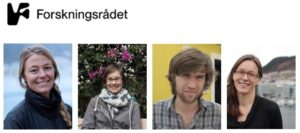We are extremely pleased that we seem to be following up the impressive success-rate in the first rounds of allocations from the NRC this autumn. Four new grants are awarded to BIO researchers, three of these coordinated by BIO. We congratulate the fresh project leaders/-partners and their groups!
ROGRAM: Samarbeidsprosjekt for å møte utfordringer i samfunn og næringsliv (KSP)
Aud Helen Halbritter Rechsteiner (koordinator): NatuRA – Sustainable use of Natural Resources in Alpine and mountain grassland ecosystems under global change (CALL: Arealer under press)
Anna Jeja Gabriella Ljungström (koordinator): Unlocking the Nutritional and Environmental Potential of Small Pelagic Fish: A Path Towards Sustainable Food Systems (CALL: Temaer på tvers)
Vigids Vandvik (partner): Actionable budgets for sustainable climate and nature governance
PROGRAM: Forskerprosjekt for fornyelse
Anders Martin Frugård Opdal: Regional downscaling of biological predictions. From global crisis to local coping (CALL:Klima og miljø)
Read more about the projects
 Halbritter, NatuRA: The project «NatuRA – Sustainable use of Natural Resources in Alpine and mountain grassland ecosystems under global change» is a Collaborative and Knowledge-building Project for the call “Area under pressure”. The overarching objective of the NatuRA project is to generate new knowledge on how mountain grassland ecosystems and their natural resources have been traditionally and are currently managed, how they are now affected by global changes and changes in management practices, and then use this knowledge to co-develop nature-based solutions with local stakeholders to sustainably safeguard these social-ecological systems and livelihoods under global change. The project involves field experiments, modelling, syntheses, and close co-production with local expert practitioners and indigenous governance systems to ensure inclusion and maximise societal impact.
Halbritter, NatuRA: The project «NatuRA – Sustainable use of Natural Resources in Alpine and mountain grassland ecosystems under global change» is a Collaborative and Knowledge-building Project for the call “Area under pressure”. The overarching objective of the NatuRA project is to generate new knowledge on how mountain grassland ecosystems and their natural resources have been traditionally and are currently managed, how they are now affected by global changes and changes in management practices, and then use this knowledge to co-develop nature-based solutions with local stakeholders to sustainably safeguard these social-ecological systems and livelihoods under global change. The project involves field experiments, modelling, syntheses, and close co-production with local expert practitioners and indigenous governance systems to ensure inclusion and maximise societal impact.
This is a collaborative project between Norway and South Africa and builds on long-term collaboration with Peter Le Roux (University of Pretoria) and V. Ralph Clark (Afromontane Research Unit at the University of the Free State) in South Africa through the Plant Functional Trait Courses and the Biodiversa project RangeX. The project is led by Aud Halbritter and the partners involved at Bio (UiB) are Vigdis Vandvik, Alicia Barraclough and Inger Måren.
Ljungström, Unlocking the Nutritional and Environmental Potential of Small Pelagic Fish: To tackle the growing environmental and human health concerns related to our current food production and consumption patterns we are advised to transition to predominantly plant-based diets. While eating more plants is associated with better health, animal-source foods contain several important micronutrients that are not available from plants. Norway owns a plentiful resource, small pelagic fish, that is rich in these nutrients, affordable, and has a low carbon footprint.
The overarching objective of the project is to provide tangible solutions for how Norway can utilize its small pelagic fish catch to benefit public health and the environment. We will explore this via three main goals:
- Use a food systems perspective to assess how different utilization strategies for small pelagics affect nutritional output and carbon footprint.
- Provide information to guide dietary advice and product innovation for the use of small pelagic fish to help prevent nutritional deficiencies associated with plant-based diets.
- Outline guidelines for a “blue boost” label that helps environmentally conscious consumers to make healthy and nutritionally adequate choices.
Vandvik, Actionable budgets for sustainable climate and nature governance: This project helps municipalities and regional authorities make more sustainable decisions, by integrating budgets for emissions reductions and land use change into financial and other forms of administrative and political decision-making. The project unites partners at the forefront in piloting climate budgeting and nature accounting – City of Bergen and Vestland County Council – expertise from human geography, biology, political science and law at University of Bergen, NIBIO and NINA, and sustainable futures literacy agents Fremtenkt. ECOBUDGETS uses state-of-the-art methodologies for contributions to scientific literature on accountability and metrics in sustainable governance and real-world impact on climate and nature sustainability.
In this SV-fak led project BIO is partner as it builds on the ongoing NFR KSP project ECOMAP, coordinated by Vigdis Vandvik.
Opdal, Regional downscaling of biological predictions: In the face of current and future global warming, we need predictive models that forecast ecological consequences. For marine systems, such models typically consist of a global climate projection model coupled to various temperature-dependent functions that represent biological and physiological responses. Most of these functions are highly generalised and based on averages across many species and systems. Likely, such models will be wrong when applied to specific species or in particular regions. However, we don’t know, because they are almost exclusively used to predict the future, and rarely the past.
In this proposal, we pick key expectations from these global predictive models and downscale them to regional conditions for key Norwegian fish stocks using particularly long and detailed timeseries of biological data, experiments and mechanistic models of bioenergetics and life histories.
Preliminary analyses suggest that several fish species have more physiological and behavioural flexibility than generalised models give them credit for. These and future project outcomes will contribute to making better predictions, but hopefully also broaden our understanding of how temperature work and don’t work on different biological processes.

